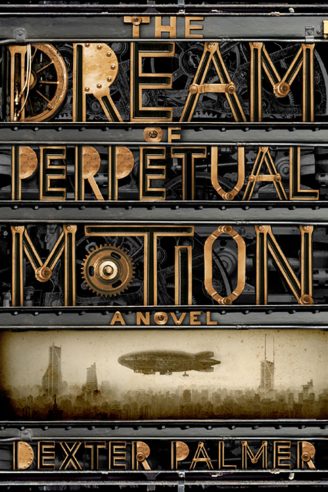Of all the steampunk novels I have read, The Dream of Perpetual Motion is the strangest and most bizarre. If I had to sum it up in one sentence it would be this: “Shakespeare’s The Tempest written in a steampunk world while Shakespeare was on a bad trip.”
Dexter Palmer draws heavily on The Tempest in his novel. The original features on several occasions and we meet strange versions of Prospero, Miranda, Caliban and Ferdinand. They are all protagonists in The Dream of Perpetual Motion to varying degrees of importance.
Prospero has some resemblance to his namesake in The Tempest, but he is a dark version of the Shakespearian protagonist: a technological necromancer more at home with devices and machines than humans and other living beings.
Miranda shares the innocence of Shakespeare’s Miranda, but this innocence also harbors a secret.
We meet further, strange characters, like the drivers of shrink-cabs (taxis which also sort your psyche out) and a sculptor who for 25 years did nothing but portray Miranda. Now he is an obsessed and insane wreck and a chilling testimony to corrupted art.
The plot itself begins during the narrator’s childhood, one Harold Winslow. He tells the story from his cabin aboard a giant zeppelin, the Chrysalis. We learn that as a child he lived in poverty in Xeroville with his father and elder sister and by fortune or fate his life became intertwined with that of the city’s ruler, Prospero Taligent, and his adoptive daughter, Miranda.
The story follows several strands, some in the recent past of the narrator’s life, some recollections of his childhood, which makes the novel a bit difficult to follow at times, though it all comes together near the end. All lines eventually converge, all the riddles are solved and all of the mysteries revealed. The Dream of Perpetual Motion may not be the easiest of novels to work your way through (my only point of contention), but Palmer manages beautifully to draw the reader into the story.
We learn about the city through Harold’s eyes and as his life progresses it becomes clear that everything is not headed toward the scientific utopia that his youth promised. Instead, we witness the decay of a society under the influence of too many machines and too much science and logic for its own good.
In between there are almost dreamlike sequences with Harold recalling his visit to Prospero’s tower: a terrible amalgam of smoke, mirrors, strange inhabitants and high technology. It is haunted by Prospero’s dreams: those he made real and his final dream, which eludes him almost until his death.
Prospero’s dreams are what is revealed to be the driving force behind everything that happens in Xeroville. Prospero wants to be a benefactor, a loving father and a philanthropist. But he cannot really understand his fellow men and all his endeavors culminate in frustration and horror.
Dexter Palmer paints a chilling picture of an increasingly alien yet hauntingly familiar culture, dominated by one monolithic cooperation and its dictates on human lives. Reality itself becomes mutable just as it is inside Prospero’s tower. It starts with the seeping-in of casual insanity in places we do not expect and ends with the unravelling of Prospero’s and Caliban’s true natures and the final fate of Miranda.
Although I would hesitate to describe this as an action novel, the tension never leaves the story. There is always another revelation, something marvelous or unexpected awaiting on the next page. When a revelation does occur, the author manages to have it come from an unexpected angle to still startle the reader.
The Dream of Perpetual Motion is a moral tale of the wonders of technology gone mad; of human endeavors corrupted by misguided motives and ill-placed good intentions. It is a haunting and harrowing tale and an instant classic. I would not be surprised to one day find it listed as “required reading” for a Shakespeare seminar. Dexter Palmer will claim his place among the masters of steampunk literature.
This story first appeared in Gatehouse Gazette 12 (May 2010), p. 12, with the headline “The Dream of Perpetual Motion”.





